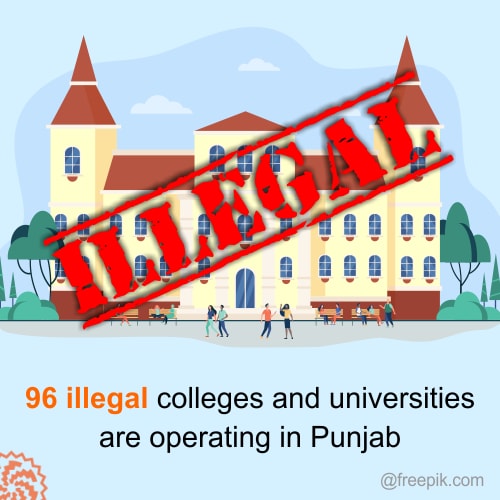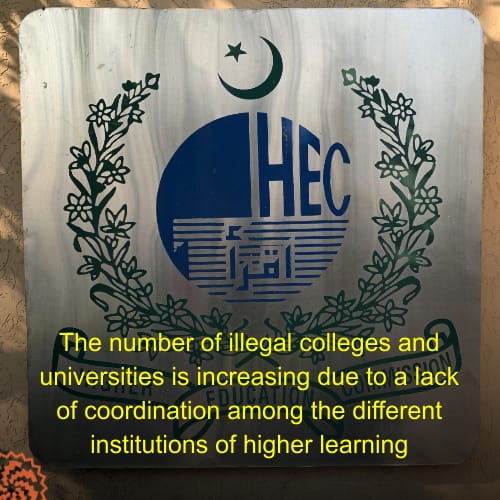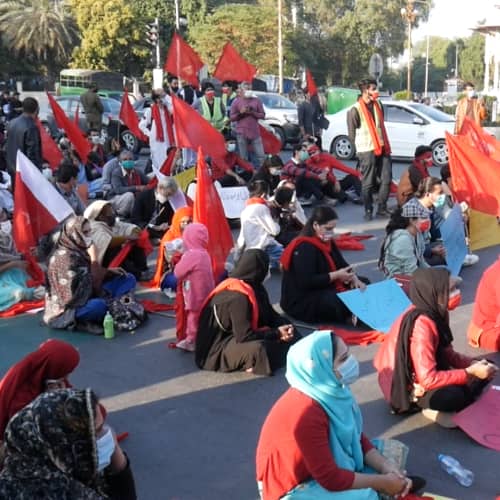Muhammad Asad and some other students had to close down one of Lahore’s major roads while
protesting to force the authorities to issue them their degrees.
Asad, a resident of Nankana Sahib in Central Punjab, shifted to Lahore in 2013 to pursue higher studies. Initially, he enrolled in a Bachelor of Business Administration programme at the University of Central Punjab, a private varsity. At the time, he paid Rs 125,000 as semester fee.
“After the first semester it became impossible for my family to pay the heavy fees, forcing me to search for universities to do my bachelors at an affordable cost,” he said.
Searching for a university, Asad came to know about a Lahore based campus opened by the University of Sargodha, a public sector institution. The campus was run in collaboration with the private sector, where thousands of students were pursuing degrees at the time. Even more important was the fact that the fee structure was much less than what he paid before - Rs 40,000 per semester - and the degree came from a recognized institution like the University of Sargodha, to boot.
However, little did Asad know that the institution was violating the University of Sargodha condition of enrolling only a certain number of students in its classes. By the time Asad was well into his bachelor's programme at the new campus, the issue turned into a full blown dispute, with the University of Sargodha refusing to issue degrees to students at the Lahore campus.
Financial and Administrative Irregularities
The National Assembly’s Standing Committee on Education directed the Higher Education Commission for a special audit of the varsity after reports of financial and administrative irregularities appeared in the media. A news report carried by the English language Pakistan Today on July 1, 2018, made startling revelations about irregularities involving the varsity’s vice chancellor Muhammad Akram Chaudhry and register Muddasir Kamran, quoting the 100 pages long audit report
The report said that the officials allowed two private entities to open University of Sargodha's sub campuses in Lahore and Mandi Bahauddin, a city in central Punjab, in violation of relevant rules and regulations.
Asad by then had completed his degree programme and had started worrying about receiving a degree. He and some other students demanded that the varsity issue them their degrees. Eventually, they were able to receive these.
A shock awaited a relieved Asad and other students, however. When he applied for a job at a bank, submitting his degree as a proof of qualification, he was informed that the degree did not come from the University of Sargodha.

The same had happened to 3,000 other students. Reneging on its promise of providing a degree from the University of Sargodha, the sub-campus in Lahore had issued them its own degrees.
Taking to the Streets
Asad said that he tried to take up this issue with the administration but without any luck. He did manage to persuade some of his fellow students about the gravity of the matter and they agreed to do something to resolve the issue after initial reluctance.
In time, the students approached the Supreme Court of Pakistan’s human rights cell in September 2018, seeking to be issued degrees from the University of Sargodha.
"Time and again, we approached Lahore's registry of the apex court to remind the relevant cell about our application but nothing came of it," said Asad.
After losing his hope in court, Asad gathered six hundred other students of the college and closed the road in front of the campus in Chung area of southwestern Lahore, one of the city's major roads.
The protest continued for about 22 hours.
The relevant authorities later shut down the Lahore campus after reviewing its affairs and transferred all the students to the University of Sargodha main campus. The varsity issued degrees to all protesting students within the next 10 days.
Following the protests, the then Chief Justice of Pakistan Saqib Nisar also took notice of the issue and directed the National Accountability Bureau (NAB) to take action against those responsible.
After this order, NAB arrested Dr Muhammad Akram Chaudhry, former registrar Brigadier (retired) Rao Jameel Asghar and chief executive of the Lahore campus Mian Javed Ahmed in October 2018. Mr Ahmed died of cardiac arrest in December while in the Lahore Camp Jail.
The probe established that the varsity officials had given permission for opening the two sub campuses after taking millions of rupees in bribes and without seeking permission from the Higher Education Commission (HEC) to do so.
Administrative and legal lacunae
Earlier in November 2017, when the HEC declared a private business school in Lahore - Imperial College of Business Studies (ICBS) - illegal, about 20,000 students enrolled in different programmes faced the same dire prospects as Asad.
Suddenly, these students' plans and prospects for an academic career faced an impending disaster.
Asadullah Shah, a BSc student and a resident of Khyber Pakhtunkhwa was among these students. "We started worrying about being denied a degree after studying for years and spending huge sums in fees," said Shah.
The students started an agitation within their educational institution that continued for many months, finally culminating with the HEC accepting their demands in 2018 and issuing them with verified degrees.
Higher education officials said that there were still many institutions like ICBS operating in the province without the HEC's permission. A list available on the HEC website puts the number of these illegal institutions in Punjab at 91, with another 35 in Sindh and 11 in Khyber Pakhtunkhwa province.

Recently, a Supreme Court bench headed by Justice Umar Ata Bandial also confirmed the presence of such institutions in Punjab during a hearing. The bench was hearing petitions of students enrolled in illegal campuses of Preston and Al Khair University in Lahore and Karachi. The students demanded that they should not be punished for studying in illegal campuses and the HEC should be directed to issue them degrees.
On December 15, 2021, the Supreme Court directed the HEC to ensure coordination between the centre and provinces to keep check on the legal status and educational standards of higher education institutions. The bench also directed the commission to take necessary steps to enforce policies for uniform higher education standards across the country.
Who is responsible for the oversight of higher education institutions?
Leading physicist Dr Pervez Hoodbhoy, who is also a vocal critic of the educational policies, said the illegal campuses throughout the country proliferated due to lack of coordination between the centre and provinces.
He said that the HEC's responsibility did not end with simply alerting students about illegal campuses. "Rather, it should formulate and implement a comprehensive policy [to check the mushrooming of such institutions]."
Also Read

A recipe for disaster: How Single National Curriculum will divide the country further along class lines
Matti-ur-Rehman, an official of Punjab Higher Education Department (HED) said that coordination between the centre and provinces on the subject was literally non-existent. He said that there existed no formal linkages between the HEC, HED and Punjab HEC to determine the responsibilities and powers of each organization, resulting in opposing policies.
Rehman said that no provincial department in Punjab had taken it upon itself to collect and release details of illegal educational institutions. He said that in the absence of such a record, the number of illegal institutions could be much higher than those available on the website of the HEC.
Published on 4 Apr 2022




















